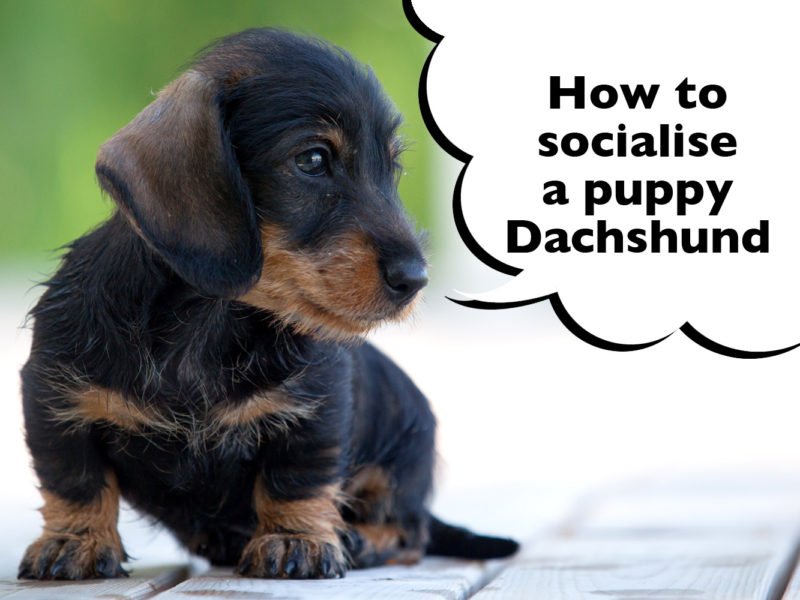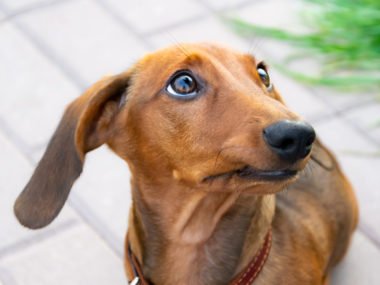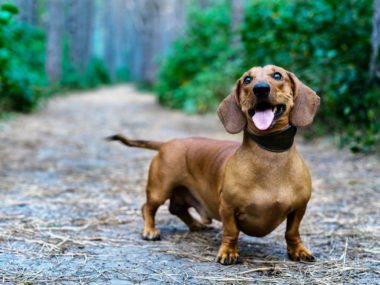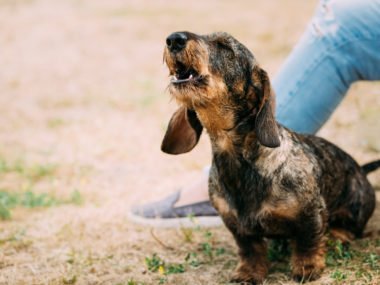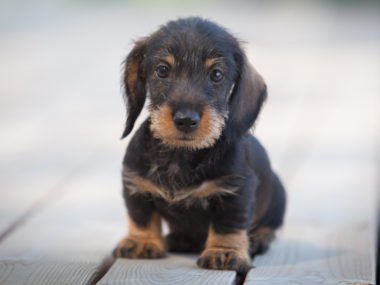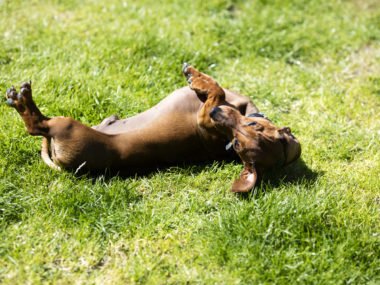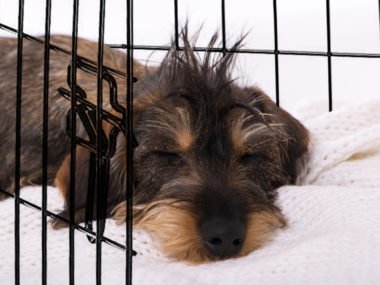Have you just got a new Dachshund puppy? Are you wondering how to socialise them and what you need to do? Here’s everything you need to know about how to socialise a Dachshund puppy.
How To Socialise A Dachshund Puppy:
- Get your Dachshund used to household appliances
- Introduce your Dachshund to floor sensations
- Make noises around the home
- Fill a room with unfamiliar objects
- Expose your Dachshund to music
- Introduce your Dachshund to the yard
- Dress up in different outfits
- Introduce your Dachshund to new people
- Buy toys in different materials
- Take your Dachshund for a drive in the Car
- Carry your Dachshund out and about
- Visit the Vet with your Dachshund
- Take your Dachshund out for walks (after jabs!)
- Take your Dachshund on public transport (after jabs!)
- Go to stores with your Dachshund (after jabs!)
- Visit friends with your Dachshund (after jabs!)
- Sign up for puppy classes (after jabs!)
But before you start switching on the kettle or hoover, there’s more you need to know. Read on to find out what socialisation is, why it’s important, what happens if you don’t socialise your Dachshund, when you should start, and what exactly you need to do!
Table of Contents
- What Is Socialisation For Dachshunds?
- Why Is Socialisation Important For Dachshunds?
- What Happens If I Don’t Socialise My Dachshund?
- When Should I Start Socialising My Dachshund?
- Can You Socialise An Older Dachshund?
- Should I Wait Until After Vaccinations To Start Socialising My Dachshund?
- How To Socialise A Dachshund
- What do I do next?
This article is based on research and personal experience as a Dachshund owner of 10+ years. I’m not a Vet, qualified dog trainer or dog behaviourist.
What Is Socialisation For Dachshunds?
Socialising your Dachshund means getting him used to being in new environments and around new people and dogs, so he feels happy and relaxed in any situation.
It involves training your Dachshund by gradually introducing him to a variety of new experiences, using positive reinforcement to make him feel confident and comfortable.
Socialisation gets a Dachshund used to experiencing new sights, smells and sounds. So he doesn’t feel anxious when in an unfamiliar environment or if he sees, hears or smells something new.
It really is the difference between a contented, outgoing Dachshund who loves meeting new people and gets on well with other dogs, and a fearful, nervous Dachshund who you can’t take anywhere because you’re so worried he’ll snap, bark or be overly distressed.
Why Is Socialisation Important For Dachshunds?
Socialisation is an essential part of your Dachshund’s training because it gives him the confidence he needs to be able to cope in new situations. This makes it less likely he’ll develop behavioural issues and will end up a more friendly and happy dog.
It’s even more important for Dachshunds than it is for other breeds, as Dachshunds are naturally wary of strangers (this is to do with their hunting heritage and pack instincts).
With proper socialisation, you and your Dachshund will be able to:
- Travel in the car
- Go for walks wherever you like
- Meet up with friends for group dog walks
- Go to doggy day care
- Walk in the park with new dogs around
- Stay at your friends houses
- Go into coffee shops or stores
- Welcome new people into your home
- Go on holiday together
- Stay in hotels or other accommodation
- Be around children
- And much more!
In general, your Dachshund will be calmer and much more accepting of new people and other dogs if he’s socialised from a young age.
You’ll have the freedom to live your life with your Dachshund by your side, rather than having to change the way you live to accommodate a nervous, over-protective, on-edge Dachshund.
What Happens If I Don’t Socialise My Dachshund?
If you don’t socialise your Dachshund, they may:
- Bark, growl or snap at strangers
- Be aggressive towards children
- Lunge, bark, growl or snap at other dogs
- Bark at passing cars
- Be generally nervous and on edge
- Be overly protective and bark at every noise in the home
- Not like having new people in the house
- Be petrified of new noises or people
- Get stressed, anxious or aggressive if you take them to someone else’s house
- Not be able to go to doggy day care
- Not be able to go on holiday
- And more!
Without good socialisation, your Dachshund won’t learn to cope with new situations, and may become fearful, anxious or aggressive whenever something unexpected happens.
This is extremely limiting for you, as it means you’ll have to assess every situation beforehand to make sure it’s OK for your Dachshund.
You might end up missing out on a lot because you know your Dachshund can’t handle it. And that constant worry can become very stressful.
The last thing you want is a situation where you’re having to avoid people and places just because your Dachshund gets scared or anxious.
And that’s why socialisation from an early age is SO important!

When Should I Start Socialising My Dachshund?
Start socialising your Dachshund at 8 weeks old. Between 3 and 16 weeks is when your puppy will be most receptive to training and new experiences, and that will decide the type of Dachshund they’ll become.
You won’t be able to bring your puppy home until they’re at least 8 weeks old so you can’t start socialisation before then. However, a good breeder will have already started getting your Dachshund used to new experiences from about 3 weeks old.
Use positive reinforcement techniques and lots of treats, and be prepared to take things slow and gradual. You don’t want to overwhelm him all at once!
Can You Socialise An Older Dachshund?
Socialising a young puppy is much easier than socialising an older Dachshund who’s set in his ways. That said, it’s never too late to work on socialisation with a Dachshund.
You might not achieve as good results as if he were a puppy, but you can definitely help your Dachshund feel more confident, comfortable and settled in new environments if you work at it.
Should I Wait Until After Vaccinations To Start Socialising My Dachshund?
Socialisation of your Dachshund will start with the breeder and continue when you bring him home at 8+ weeks old. However, your Dachshund needs to have his vaccinations before you can start socialising him in public places and with new dogs.
You do have to very careful before vaccinations are complete. Otherwise, your Dachshund might catch an illness, such as canine parvovirus, which is spread by contact with another dog’s faeces, and can sadly be fatal.
Talk to your vet about the vaccinations your Dachshund needs to have had before you can start socialising him in public spaces.
Thankfully, there are many ways you can work on your Dachshund’s socialisation skills before he’s had all his vaccinations.
This is without him coming into contact with new people or dogs, or touching the ground in public places or parks.
How To Socialise A Dachshund
The key to socialising your Dachshund is to start small and gradually build up different experiences. Keep his training sessions short and fun so he doesn’t get overwhelmed.
This is how to socialise a Dachshund:
Get your Dachshund used to household appliances
Get your Dachshund used to as many household appliances as possible. Slowly introduce the TV, laptop, hairdryer, hoover, washing machine, dishwasher, coffee machine, kettle, steamer, and anything else you use in your home.
Introduce your Dachshund to floor sensations
Get your Dachshund to walk around on different floor surfaces in the home to get him used to new sensations on his feet. Walk him across carpet, rugs, wood, stone and porcelain tiles so he doesn’t get freaked out by new textures or finishes as he grows older.
Make noises around the home
You can get your Dachshund used to unexpected noises by making different sounds as you move around your home. For example, tapping on the counter or knocking on the door.
Don’t make a big deal of it, just make the noise and then carry on as usual. You want your Dachshund to understand that unexpected sounds are normal, rather than something to be frightened or protective of.
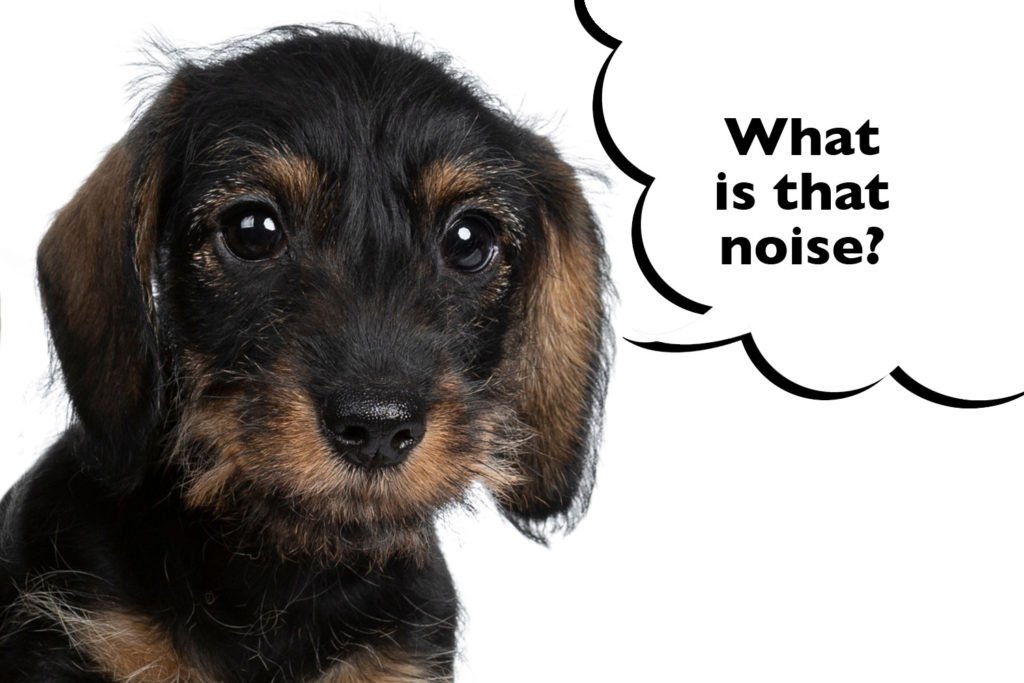
Fill a room with unfamiliar objects
Put different objects out in a room and let your Dachshund explore them. You could hide treats in the different objects to reward him for being brave and getting close, so he associates them with good things.
Expose your Dachshund to music
Play different types of music in the home at varied volumes. Start low and build up to normal levels (not too loud obviously!).
Put the radio on a talking show too, so your Dachshund gets used to different voices and sounds in the home.
Introduce your Dachshund to the yard
Take your Dachshund out into the yard (if it’s safe to do so before vaccinations) and let him explore all the new smells. Hopefully there’ll be some new sounds for him, especially if you live in a busy area.
If your neighbours are in their garden, this is a great opportunity to let him get used to hearing strangers nearby.
Dress up in different outfits
Dress up in different clothes in a variety of textures and colours. Dachshunds seem to get particularly freaked out and confused if you wear a hat, hood, cap or glasses, so this is a really good thing to get him used to while he’s still young.
Then interact with your Dachshund normally to see how he responds. You can also try holding out a treat and letting him come to you when you’re dressed differently.
Don’t ever push things though. Always crouch down and let your Dachshund come to you in his own time. If he looks overwhelmed, move away and try again another time.
Introduce your Dachshund to new people
Introduce your Dachshund to a variety of male and female friends and family at your home. Get him used to men with beards or moustaches so he’s not scared of them in later life.
Have children and teenagers round to your home and let them play with your Dachshund. Just make sure he’s closely supervised and remove him if you see any signs of fear or aggression.
Let your Dachshund meet the postman, couriers, and Introduce him to any food delivery people or workmen. Dachshunds often freak out at high-vis jackets or uniforms if they haven’t come across them before!
Buy toys in different materials
Get an assortment of dog toys made from different textures and materials. it’s good for Dachshunds to feel lots of new sensations with their mouths, especially when they’re young.
Take your Dachshund for a drive in the Car
Take your Dachshund puppy for a drive in the car. It’s important to get him used to the motion of the car going along the road. Start with short journeys and build it up so he doesn’t get car sick as he gets older.
Carry your Dachshund out and about
It’s fine to put your puppy in a sling and take him around the neighbourhood. Carry him on a short walk so he can safely get used to the different sights, sounds and smells nearby.
You can do this before vaccinations are complete, but you do have to be careful. Just make sure that he never comes into contact with anything outside, including the ground, other dogs and people.
Visit the Vet with your Dachshund
Take your Dachshund to meet the vet for a heath check. The vet will make a fuss of him so he remembers it as a fun experience for when he has to go back in the future.
Take your Dachshund out for walks (after jabs!)
After vaccinations, start taking your Dachshund for short walks in lots of new places like the park, neighbourhood, woodland, town, countryside, beach, and so on.
Meet up with a friend that also has a dog, and go on a leash walk together. Just make sure you introduce the friend and dog properly to your Dachshund.
Walk your Dachshund in places with new noises, such as near a railway line or beside a busy road (if it’s safe to do so of course!).
This’ll build confidence and create positive experiences so he’ll be happy to walk wherever you take him in future.
Take your Dachshund on public transport (after jabs!)
After vaccinations, if you travel on public transport, it’s good to take your Dachshund on the bus or train. He needs to get used to the people, sights sounds and smells all around.
Doing this while your Dachshund is still young, will make him much less likely to freak out when he’s older.
Go to stores with your Dachshund (after jabs!)
After vaccinations, take your Dachshund to a cafe or shop that allows dogs, and to the local pet store to buy some treats or a new toy. This’ll build confidence and familiarise him with lots of different people, dogs, and new sights, sounds and smells.
Visit friends with your Dachshund (after jabs!)
After vaccinations, take your Dachshund round to friends houses so he starts to understand other homes, other dogs, people, sights, smells and sounds. You want him to feel comfortable in as many different environments and situations as possible.
That way, if you ever needed someone to look after your Dachshund for a few hours, he’ll be happy wherever he goes.
Sign up for puppy classes (after jabs!)
After vaccinations, book puppy training classes for your Dachshund as soon as you can. They’re excellent for training, socialisation, and getting him used to other people and dogs.
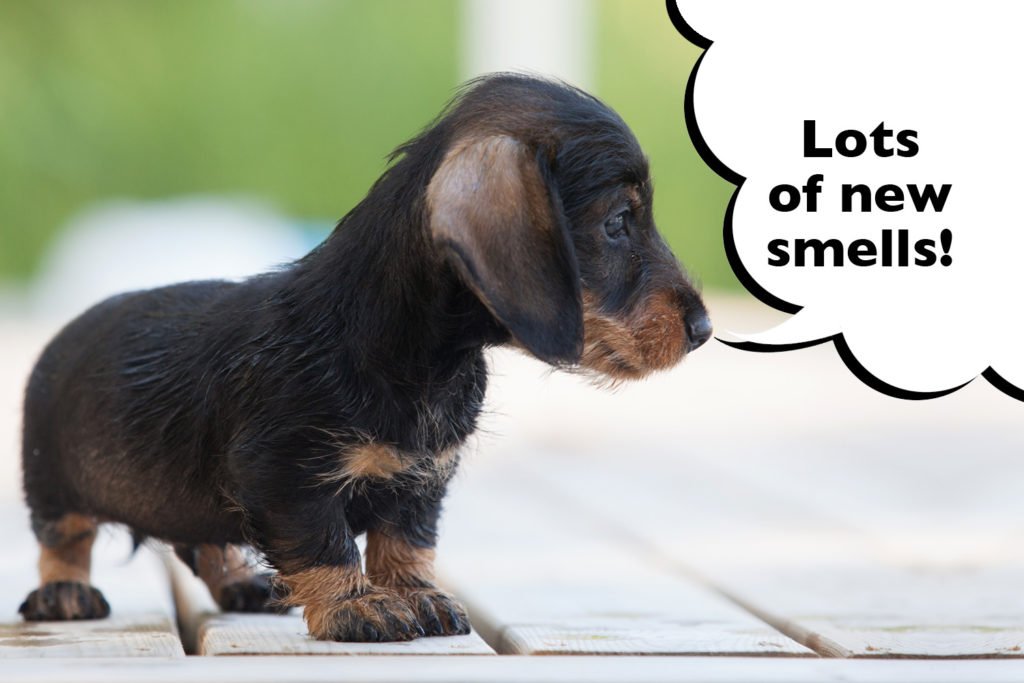
Basically, you just need to start introducing your Dachshund to new situations slowly.
If he responds calmly when he has these new experiences, give him lots of praise and treats so he associates them with feeling happy and relaxed.
If your Dachshund shows any signs of fear or anxiety, calmly take him away from the situation.
Just be careful not to fuss over your Dachshund’s too much or pick him up when he’s feeling fearful. This’ll reinforce his fear and make him feel like he was right to be scared.
Don’t worry if this happens though. You may have just gone a little too fast for him. Next time you try your Dachshund in that situation, just go a little bit slower.
For example, if you were walking your Dachshund alongside a soccer match and he was jumpy because of the sound of the ball, walk him further away from the match next time, so he can see and hear it but not enough to scare him.
If your Dachshund is relaxed, give him lots of praise and treats. Then, over the course of a few walks, gradually move closer to the match. Keep rewarding your Dachshund as he gets closer and grows in confidence.
So, there you have it! Training and socialisation are so important for your Dachshund, especially in the first 16 weeks. By exposing them to new sights, sounds and smells every day, you’ll end up with a confident, outgoing Dachshund who you can literally take anywhere and everywhere!.
What do I do next?

If you read all the way to the end of this article, you’re exactly the sort of person I’d LOVE to join my Facebook Group. Your support for my blog means everything to me so, if you found this article helpful, please kindly share below. Thank you! 💋

